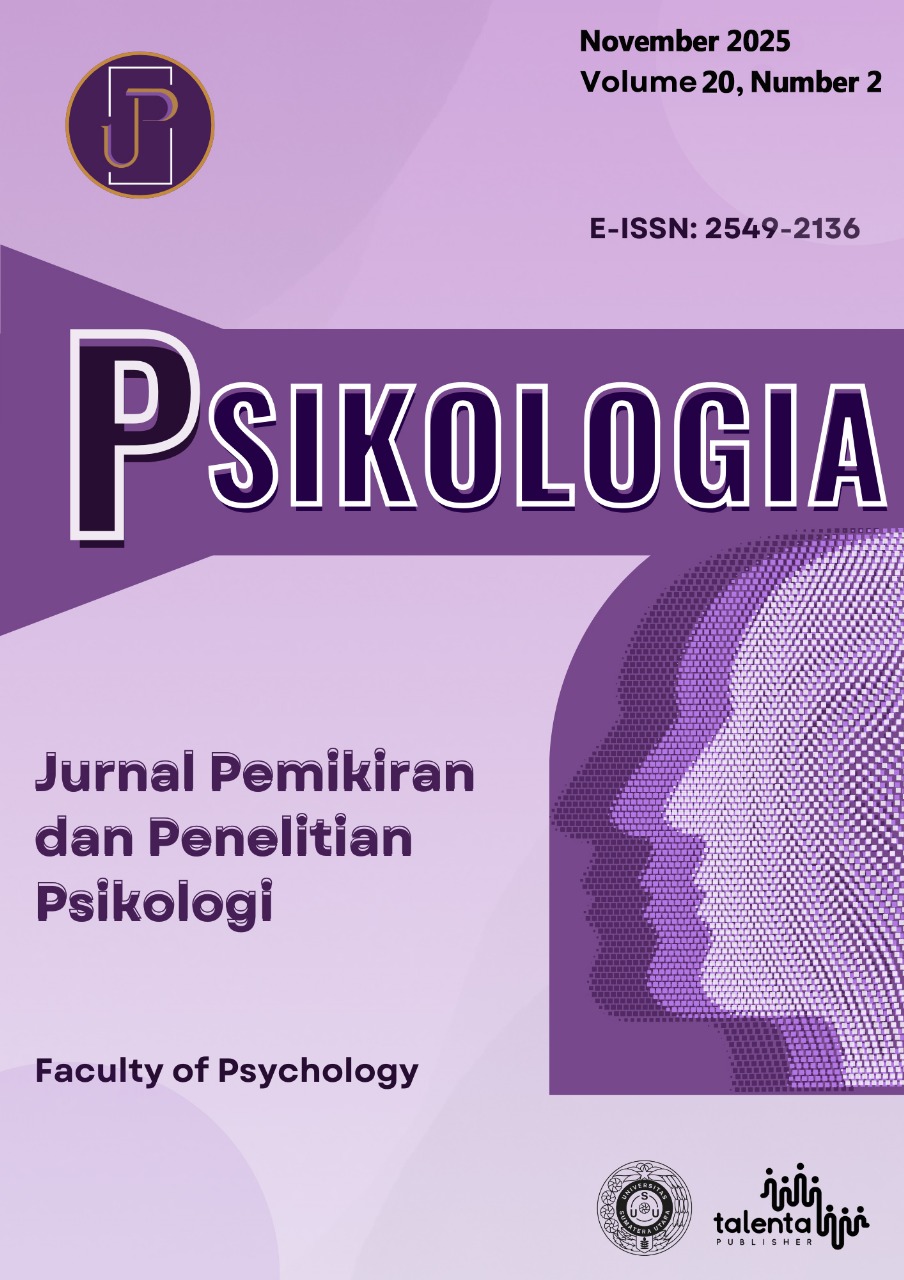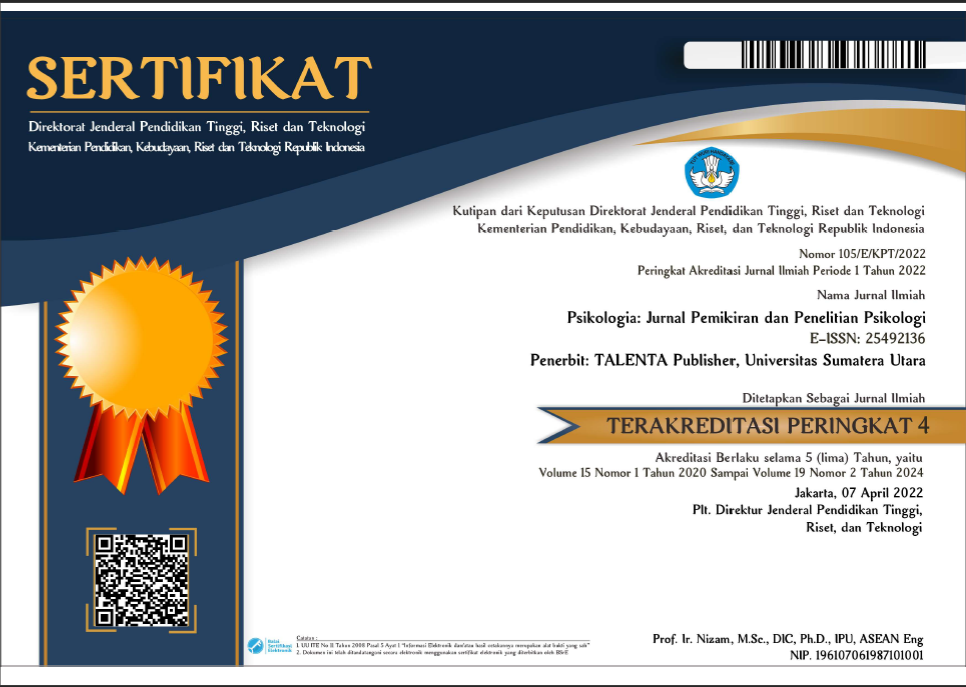Psychological well-being in former drug users
DOI:
https://doi.org/10.32734/psikologia.v20i2.23191Keywords:
psychological well-being, recovery, drug abuse, socialAbstract
This study aims to examine the dynamics of recovery among former drug users through the lens of psychological well-being, based on the six dimensions developed by Carol D. Ryff (1989): self-acceptance, positive relations with others, autonomy, environmental mastery, purpose in life, and personal growth. A qualitative approach, employing a narrative case study design, was used to explore in depth the experiences of two primary informants who have been drug-free for over a year, along with two supporting informants. Data were collected through semi-structured interviews, non-participant observation, and information gathering from various relevant sources. The findings indicate that the cessation of substance use does not solely mark recovery, but also involves the formation of a new identity, psychological growth, and meaningful social engagement. External factors such as family support, social acceptance, and participation in positive activities were found to contribute to sustained recovery. These results underscore the importance of a holistic recovery approach grounded in humanistic values and contextualized within the individual's social reality.
Downloads
References
Badan Narkotika Nasional. (2024). HANI 2024: Masyarakat bergerak, bersama melawan narkoba mewujudkan Indonesia bersinar. https://bnn.go.id/hani-2024-masyarakat-bergerak-bersama-melawan-narkoba-mewujudkan-indonesia-bersinar/
Best, D., Gow, J., Knox, T., Taylor, A., Groshkova, T., & White, W. (2012). Mapping the recovery stories of drinkers and drug users in Glasgow: Quality of life and its associations with measures of recovery capital. Drug and Alcohol Review, 31(3), 334–341.
Hasanah, N., Hidayah, N., & Safaria, T. (2023). Posttraumatic growth pada individu dewasa penyintas child maltreatment. JIIP-Jurnal Ilmiah Ilmu Pendidikan, 6(7), 4722–4733.
Keyes, C. L., Shmotkin, D., & Ryff, C. D. (2002). Optimizing well-being: The empirical encounter of two traditions. Journal of Personality and Social Psychology, 82(6), 1007–1022.
Khaira, M., & Retnowati, S. (2016). Dinamika pertumbuhan pasca trauma pada pecandu narkoba yang telah menjalani pemulihan: Studi fenomenologi [Tesis tidak dipublikasikan]. Fakultas Psikologi, Universitas Gadjah Mada. https://etd.repository.ugm.ac.id/penelitian/detail/95865
Laudet, A. B. (2007). What does recovery mean to you? Lessons from the recovery experience for research and practice. Journal of Substance Abuse Treatment, 33(3), 243–256.
Lieblich, A., Tuval-Mashiach, R., & Zilber, T. (1998). Narrative research: Reading, analysis, and interpretation (Vol. 47). SAGE Publications.
McIntosh, J., & McKeganey, N. (2000). Addicts' narratives of recovery from drug use: Constructing a non-addict identity. Social Science & Medicine, 50(10), 1501–1510.
Mutiara, D. N. I. (2010). Keterampilan psikologis untuk meningkatkan efikasi diri pada pengguna NAPZA di panti rehabilitasi. JIP (Jurnal Intervensi Psikologi), 2(1), 69–98.
Patton, M. Q. (2002). Qualitative research and evaluation methods (3rd ed.). SAGE Publications.
Ryan, R. M., & Deci, E. L. (2000). Self-determination theory and the facilitation of intrinsic motivation, social development, and well-being. American Psychologist, 55(1), 68–78. https://doi.org/10.1037/0003-066X.55.1.68
Ryff, C. D. (1989). Happiness is everything, or is it? Explorations on the meaning of psychological well-being. Journal of Personality and Social Psychology, 57(6), 1069–1081.
Ryff, C. D. (2014). Self-Realization and Meaning Making in the Face of Adversity: A Eudaimonic Approach to Human Resilience. Journal of Psychology in Africa, 24(1), 1–12.
Sugiyono. (2019). Metode penelitian kualitatif, kuantitatif, dan R&D. Alfabeta.
Tedeschi, R. G., & Calhoun, L. G. (2004). Posttraumatic growth: Conceptual foundations and empirical evidence. Psychological Inquiry, 15(1), 1–18.
Yin, R. K. (2012). Case study research: Design and methods (5th ed.). SAGE Publications.
Downloads
Published
How to Cite
Issue
Section
License
Copyright (c) 2025 Ryan Ranuwijaya, Faqih Purnomosidi, Anniez Rachmawati Musslifah

This work is licensed under a Creative Commons Attribution-ShareAlike 4.0 International License.









